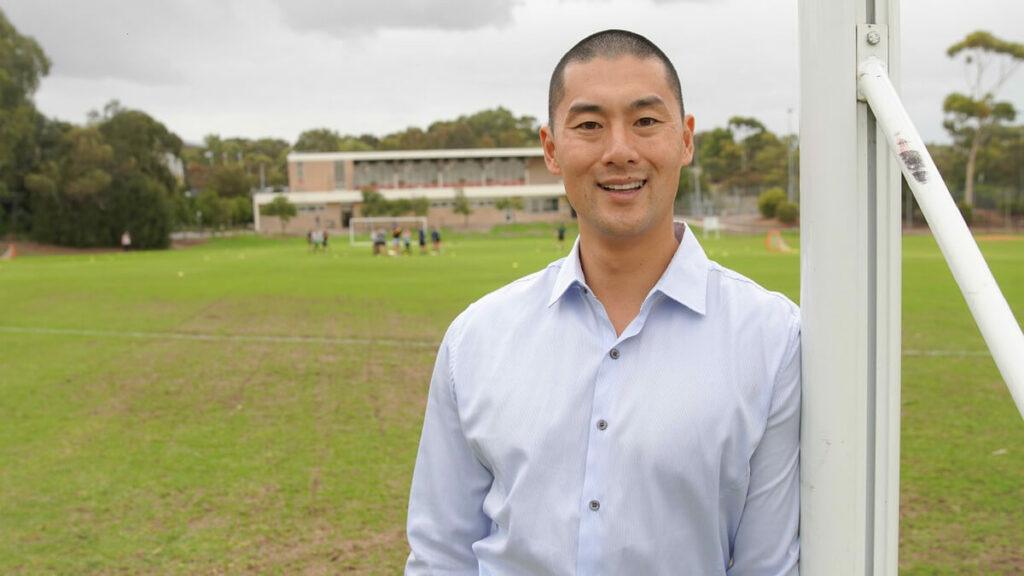As the official partner of the Football Federation of Australia’s (FFA) ALDI MiniRoos program, we want to encourage kids to be active and healthy. While exercise and nutritious food is one part of this, there is another key element to the health of children which can often be overlooked; their mental wellbeing and happiness. In fact, one of the biggest contributing factors to children’s motivation, satisfaction and long-term participation rates in sport is the involvement of their parents.
That’s why we’ve partnered with Dr. Sam Elliott, an expert in youth sport and sport parenting. With experience spanning nearly a decade, he has used his knowledge and research findings in this space in partnership with leading sport organisations, parents, coaches and children across the nation.
As parents, nothing makes us prouder than seeing our kids having a good time playing the sport they love. For parents that have spent years sacrificing their weekends to cheer on the kids, we understand the happiness you share with them when they score that winning goal or are presented player of the match. However as is the nature of sport, our kids aren’t always going to come away happy after every game.
Research has shown that what parents say before, during and after a game can create either a positive or a negative experience for their child. We understand that some parents are new to children’s sport and may be unsure of how to discuss or react to the emotional experience their child goes through while playing. That’s why we want to help parents make their children smile throughout the game, no matter what ups and downs the match may bring.
“By being involved in your child’s football this season you not only stand to benefit socially and psychologically, you’re also encouraging them to stay active and healthy,” Dr Sam Elliott says. “Ultimately, we want children to enjoy football because enjoyment is strongly associated with motivation and continued participation.”
Here are Dr Sam Elliott’s top five tips for being a supportive parent both on and off the field:
1. Give positive feedback and encouragement
Supportive feedback and encouragement is so important, regardless of how skilled your child is at the game. However, it is also important to understand what kind of support your child is looking for.
“The key is to understand how to give feedback to encourage and support your child,” Dr Sam Elliott explains. “For some children this simply means saying, ‘I love to watch you play’, while others will want you to provide specific feedback.”
2. Tune into your child’s emotional needs
Understanding what is important to your child and what brings them satisfaction in the game will make sure it’s rewarding for years to come.
“Set goals with your child and ask them what makes them happy when they play.”
“Your child may be happy just running around with their friends or maybe scoring a goal is their aim. By tuning into your child’s emotional needs you can both enjoy your football experience.”
3. Set a positive example
One way to create an enjoyable experience is to demonstrate a healthy attitude towards the game. Find ways to support your local club or organisation by volunteering for coaching roles, managing the team or becoming a committee member.
“Modelling healthy attitudes demonstrates your support and interest in your child and it reinforces your belief in football as a fun, enjoyable and worthwhile pursuit now and across their lifespan.”
“So get involved where you can and not only will you benefit, but your child will also have a great experience playing football.”
4. Take the stress out of watching sport
There can be a range of potential stressors for parents at a match. This includes everything from frustrations with an outcome, inconsistency from coaches or referees and injuries to their children.
“To ensure these stressors do not lead to inappropriate parental behaviors, recognise what you find challenging and develop a strategy to manage your emotions.”
“Developing coping mechanisms can help you from letting your emotions take over.”
One strategy Dr Sam Elliott suggests is to take time out for a week and let another person attend the game, such as your partner, a grandparent or a family friend. This will decrease the frequency of stresses you encounter and allow you to share the responsibility with others.
“Another effective strategy is to compare an immediate source of stress with previous experiences.”
“If you are frustrated with the referee’s decision, take a minute to compare this to previous games. When a referee has made the wrong decision before did it seriously affect your child’s enjoyment? Normalising the source of stress like this is a very effective strategy for reducing the intensity of stressors as they emerge.”
5. Develop a support network of parents and coaches
If you’re new to attending children’s games, think about what you can learn from others in your club.
“Approach other parents or coaches and sport providers for advice and informational support so that you feel comfortable about your involvement in your child’s football.”
“If you can identify what makes football so stressful for you and develop strategies to cope, you will enjoy a more positive experience at your child’s weekly game and so will the children.”
To learn more about the ALDI MiniRoos football program, visit www.miniroos.com.au
Click to view Dr Sam Elliott’s other videos on Sport Parenting and Managing Emotions





